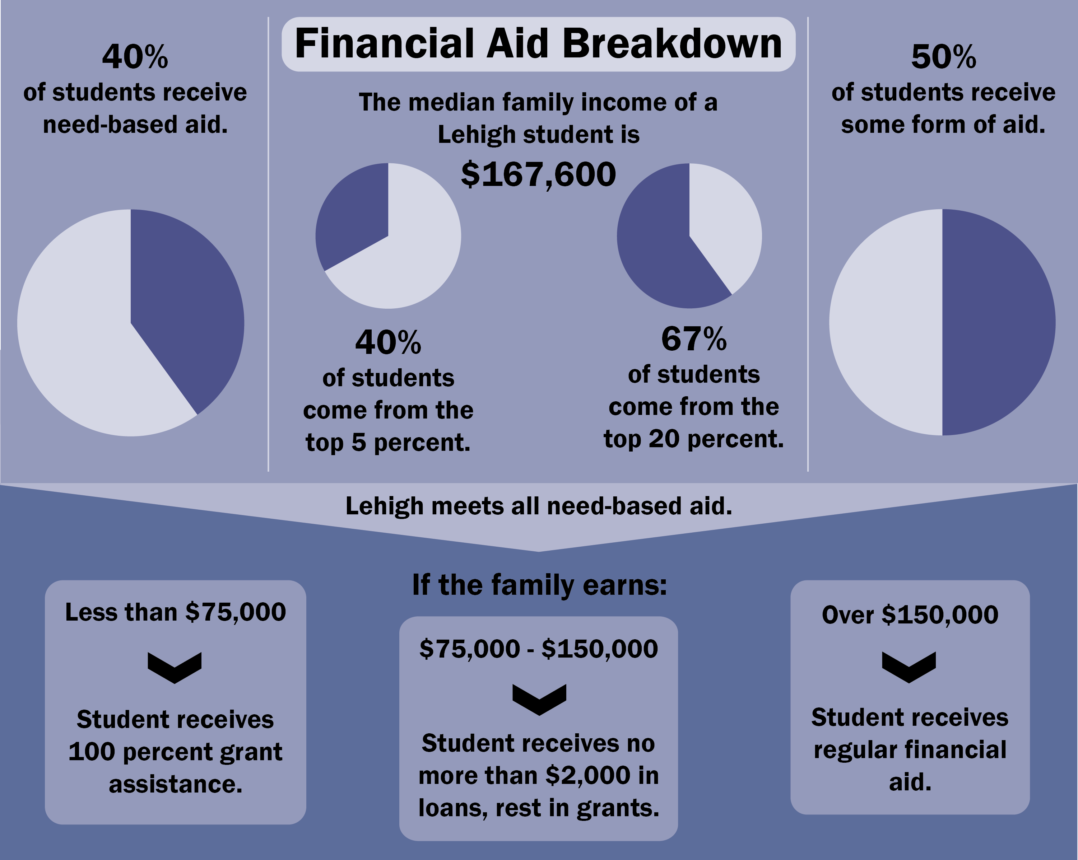
Designed by Anna Simoneau
When Daniel Moncada, ’18, arrived at Lehigh his first year, he immediately noticed the socioeconomic divide among students.
His classmates talked about playing golf, a sport he had never tried, or joining Greek life, a luxury he would struggle to afford.
“There’s a cultural dissonance that happens between students,” Moncada said. “Coming from a lower- to middle-class background, I just didn’t really relate to a lot of students in various ways.”
In January, The New York Times released a study of the median family incomes of college students in the United States. When Moncada saw Lehigh’s results, he wasn’t surprised.
According to the study, the median family income of a Lehigh student is $167,600. Forty percent of students come from the top 5 percent and 67 percent come from the top 20 percent.
Donald Outing, the first vice president for equity and community, hired February of 2017, discovered this information while researching Lehigh before he applied for the position. With the establishment of this novel role, Lehigh hopes to increase diversity and inclusion in all forms.
Outing said he’s determined to recruit, admit and retain more first-generation and low-income students looking to access the American dream through college.
“I think we’ll see a shift in those demographics if we’re successful,” Outing said, “and not because we’re excluding anyone, but because we’re including a larger population of people that are considering Lehigh.”
He said many students come to college having only interacted with people of the same socioeconomic status, and they aren’t equipped to interact with people who fall into different financial categories.
Outing said socioeconomic differences become evident during activities as mundane as going to a restaurant or bar. If not all students have the discretionary funds to enjoy a night out on the weekend, how can their peers be sensitive and mindful in those situations? Outing said the answer cannot always be “I’ll buy for you” because it diminishes a person’s value.
His job is to think about solutions to these scenarios, especially as Lehigh looks to add 1,000 students to campus by 2025 through the Path to Prominence plan.
“What are the capacities we need to develop — the human capacities as well as the resource capacities — to help those students and ensure this is a welcoming environment where they can thrive and succeed as well?” Outing said.
Since Outing started his position Feb. 1, he has not yet established an in-depth strategy, but he’s working with offices and departments across the university.
Admissions is one of those offices.
Bruce Bunnick, the interim vice provost of admissions, said his office has several strategies to attract low-income students to Lehigh. The first is through the American Talent Initiative, a program that aims to increase the number of talented low- to moderate-income students at Lehigh.
The American Talent Initiative was established by Bloomberg Philanthropies, and in February, Lehigh joined the initiative along with 29 other colleges and universities in the United States with consistently high graduation rates.
Over the past five years, Lehigh has also formed partnerships with community-based organizations primarily located on the East Coast in cities like New York, Philadelphia and Newark, New Jersey. The not-for-profit organizations work with students from large high schools, sometimes in inner-city neighborhoods, to give them college guidance counseling.
“I think we have an obligation — a societal obligation and a mission obligation — to diversify this campus, ethnically, male-female, financially,” Bunnick said.
However, he foresees challenges arising for the university. With an increase in diversity efforts, the financial aid budget needs to increase as well.
The Financial Aid Office currently meets 100 percent of students’ demonstrated need, either through grants, loans or scholarships.
Lehigh’s loan elimination and loan reduction policies were modified several years ago to better assist low-income families. Jennifer Mertz, the director of financial aid, said several individuals on the board of trustees were concerned about students’ debt levels upon graduation and spearheaded the change.
As the policies currently stand, families who makes less than $75,000 receive 100 percent grant assistance and are not issued any loans to meet their need. For families who make between $75,000 and $150,000, Lehigh does not issue more than $2,000 in loans to meet their need, and the rest is covered by grants. Any families that make above $150,000 receive regular financial aid packages.
Mertz said 50 percent of students receive financial aid in some capacity, but that doesn’t necessarily mean institutional need-based aid. She said some students who can afford the cost of attendance decide to take out loans for a variety of reasons, most commonly to build credit.
Mertz said about 40 percent of Lehigh students receive institutional need-based aid.
With the Path to Prominence initiative bringing more students to campus, and since Lehigh continues to be a need-blind institution, Mertz said there needs to be a shift in the internal allocation of funds.
“We’re definitely going to need more money in the financial aid budget if we’re serious about increasing financial diversity,” Mertz said.
Bunnick said Lehigh collects this money through alumni donations, future capital campaigns and endowments from corporations that want to diversify the college population in order to diversify the workforce.
But recruitment and admission is only half the battle. Retention is the other half.
“I can easily make the incoming class look any way you want, but that graduating class is going to look very homogeneous if you’re not prepared to be accommodating,” Outing said.
Ian Birky, the interim vice provost for Student Affairs, said his office employs many strategies to retain low-income and first-generation college students.
In addition to academic tutoring and mentoring programs, Student Affairs offers a program called Lehigh University Summer Scholars Institute. Established in 2014, the program is designed for first-generation students to socialize and adapt to college life the summer before their first year. The program continues throughout the students’ four years. Once the students go through the program their first year, they become mentors for the incoming students their next three.
Student Affairs also has a grant and loan program for students who don’t have money to pay for necessities, such as food, medical bills or winter coats. Although Birky said his office sometimes issues loans, the majority of students receive grants instead.
Whether it’s a result of these programs or other factors, the retention rate of first-generation students is high. According to data gathered by Lehigh’s Office of Institutional Research, between 2013 and 2015, the retention rate of first-generation students consistently remained above 92 percent.
In fact, in 2014, the retention rate of first-generation students, 96.7 percent, exceeded the retention rate of students who are not first generation, 94.6 percent.
Although there is a strong correlation between first-generation students and low family incomes, Meg Munley, Lehigh’s research analyst, said it’s difficult to specifically track the retention rates of low-income students. She said the student would have had to apply for financial aid, and it’s hard to define what qualifies as “low income.”
Birky said he’s happy with the university’s efforts to make campus more accurately reflect the world.
“If you don’t have that economic diversity in a university setting, I just don’t think you’re prepared to live realistically in a world where you can then interact with the full range of humanity,” Birky said.
Hugo Ceron-Anaya, a Lehigh sociology professor who specializes in wealth and privilege, has noticed some of his students cannot relate to the struggles of low-income individuals because they are so far removed from that lifestyle.
“I think for most Lehigh students, the issues of class and race are very hard to understand, mainly because they have so deeply internalized their own privilege,” Ceron-Anaya said.
To make it easier for students to understand socioeconomic diversity, Ceron-Anaya often frames the discussion in terms of sexism and gender exclusion. He said if a man is only ever surrounded by other men, he will not understand sexism because he has never experienced it and therefore doesn’t believe it exists.
When this analogy is applied to socioeconomics, Ceron-Anaya said its meaning and importance sometimes gets lost on students.
“We in the United States have a really hard time thinking about class,” he said. “Class is a foreign concept in our nation. The view that we are all equal in front of the law prevents us from understanding that some of us are more equal than others.”
Ceron-Anaya said class naturally brings about the discussion of inequality — a topic no one, especially those unaffected by it, likes to talk about.
Moncada thinks these discussions are essential to reduce the socioeconomic divide he’s felt on campus since his first day.
As the co-chair of diversity and inclusion for Student Senate, Moncada is working on a video campaign to address the issues of diversity on campus. He’s already received a lot of responses from students eager to participate.
“Reading the responses we’ve gotten, there are so many stories and so many times that students have felt that they don’t feel comfortable being apart of Lehigh,” Moncada said. “People don’t want to talk about this because it makes them uncomfortable, so they turn a blind eye to it.”
Moncada thinks the biggest hurdle to overcome is students’ general disinterest in issues that don’t affect them. Through this campaign, he wants to force students to have these difficult conversations in order to build empathy.
“Sometimes you have to make people uncomfortable to bring about progress,” Moncada said.
Outing thinks the greatest components for achieving progress are compassion and sensitivity. When students are coming to campus as 17- and 18-year-olds and interacting with people from different socioeconomic classes than they are used to, Outing said they are bound to make mistakes.
But he said Lehigh needs to correct those mistakes before they turn into systematically bad behavior.
“If those behaviors become apart of the culture and we’re seen as an elitist, unwelcoming institution, it’s going to be a detriment to everyone here,” Outing said.
He is determined to make sure that doesn’t happen.
By providing a college education to groups of people who have been historically deprived of this opportunity, Outing thinks it will benefit the entire Lehigh community. He said it will broaden everyone’s capacities to be better leaders and to be better stewards to the American population in general.
“When you lift the capacities of one group,” Outing said, “all groups rise along with them.”





Comment policy
Comments posted to The Brown and White website are reviewed by a moderator before being approved. Incendiary speech or harassing language, including comments targeted at individuals, may be deemed unacceptable and not published. Spam and other soliciting will also be declined.
The Brown and White also reserves the right to not publish entirely anonymous comments.
7 Comments
Every student that gets financial aid should have some component as a loan despite their family income. Having a loan to Lehigh provides a solid connection that can continue after the loan is paid as a donation. Receiving aid is a privilege and all graduates start their first job on an equal footing unrelated to family income status.
… if a man is only ever surrounded by other men, he will not understand sexism because he has never experienced it and therefore doesn’t believe it exists.” Experience may be the best teacher but much of education consists of reading about things that we may never experience but can gain an understanding of. We probably will not get a full understanding but certainly a reasonable person will believe in its existence.
Consider the Holocaust, I didn’t experience it, but I believe it occured. A person who claims it never happened may be reasonable but only to the extent to which that non-belief suits his agenda.
Indeed what is “low income” as it relates to Lehigh families?
“Donald Outing, the first vice president for equity and community, … . With the establishment of this novel role, Lehigh hopes to increase diversity and inclusion in all forms.”
You can foster inclusion by making teamwork a condition of success. Indeed teamwork is a condition of success but some would rather fail than be a positive member of a team. They would rather die than quit. Inclusion is not something you can require, it needs to be desired. At Lehigh I was confronted with failure while attempting to combat irresponsibility. Coping seems to have been the reasonable alternative. Coping may still work.
Housing assigments promote diversity. Class assignments promote diversity. Athletic teams can promote diversity. Apparently B&W promotes diversity. Respect for others promotes diversity. Protests promote divisiveness.
I love that this article was written, but, as a Lehigh alum that graduated last year, I can say that the financial aid policy they have listed above is not true. My family makes less than 150K a year and I got about 2K in grants each semester and the rest in loans. Unless they decided to change the policy this year, Lehigh is blatantly lying about their financial aid.
Is this am article or an editorial?
As someone whose parents paid for my entire tuition, etc. (and I know how fortunate I am to have had that), it truly seemed like the school found ways to make sure that the families who were at the top percentage of earners paid for everyone else. It appears this has only become more true.
First you start by getting rid of all fraternities and sororities they are 100% cancer at a way to expensive college
What kind of solution is that. Fraternity life was a positive for me as it was a lesson in leadership. I was a first generation student from a lower income family. I took loans & worked as a waiter in the faculty dining room during school & worked every summer. None of that stood in the way of joining a fraternity & carrying loans into the real world.
All this diversity stuff is so overblown. Professors now whose specialty is to promote this garbage. If you demonstratevthe academic capability to get into Lehigh you will be able to afford it. The fact that your parents earn less money than your roommate was a non event in our lifetime. When we graduated, I was on the same level playing field as my roommate!!